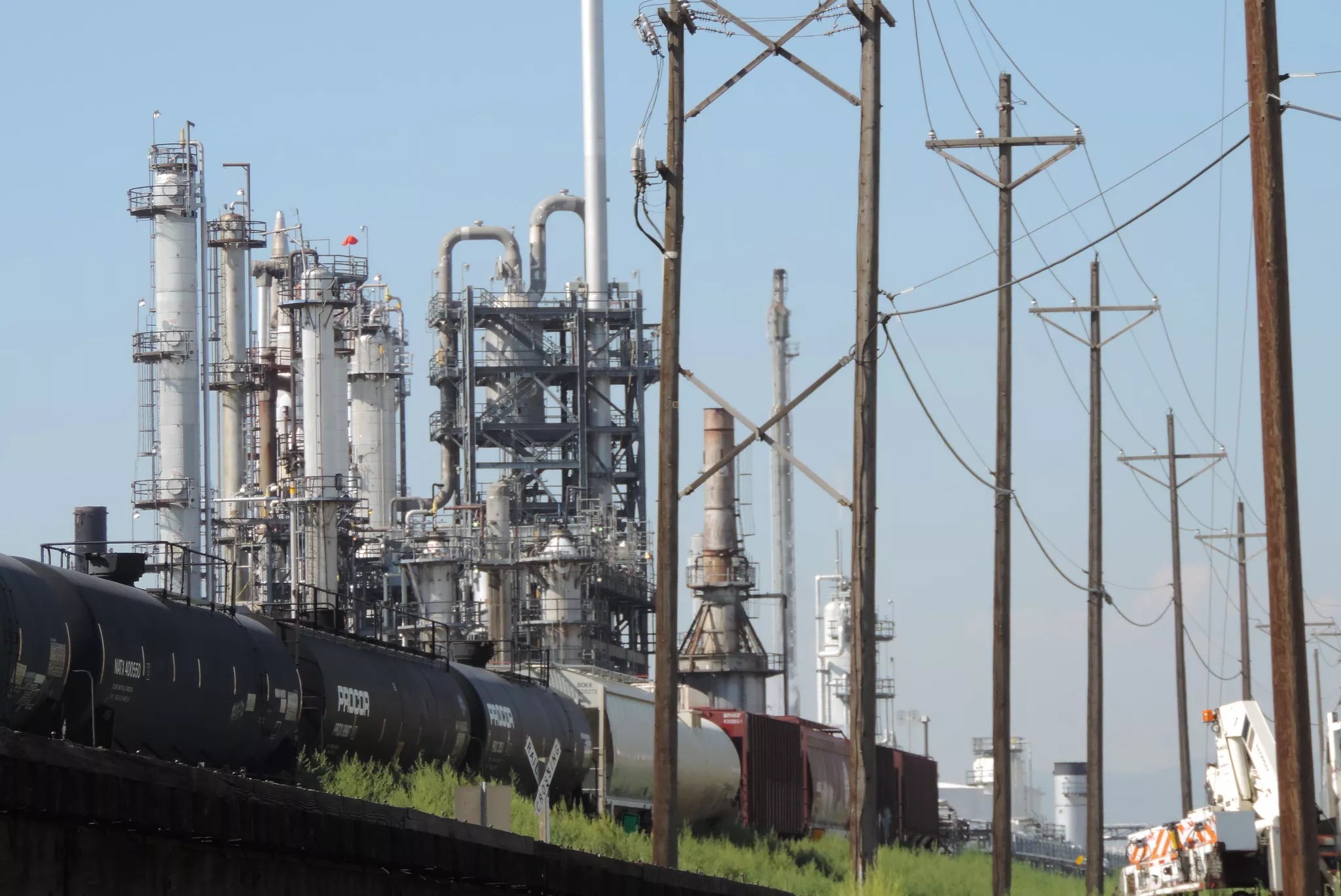
Walk Ride Colorado Facebook page

Audio By Carbonatix
A recent study commissioned by EarthJustice, a nonprofit focused on environmental law, found that PFAS pollution in Sand Creek and the South Platte River is partially caused by the Suncor oil refinery in Commerce City.
According to the study by Westwater Hydrology, water discharged from one of the refinery’s outfalls accounted for between 16 and 47 percent of the total PFAS in Sand Creek and between 3 and 18 percent of the total PFAS in the South Platte in 2021. PFAS are man-made “forever chemicals” that resist grease, water and oil, and do not break down over time. The chemicals have been linked to cancer and other negative health effects.
Lucy Molina, an activist who lives next to Suncor, points out that PFAS contamination is just another way the refinery hurts its neighbors and those who live downstream. “I’ve been saying I told you so,” she says. “The community knows that they’ve been dumping stuff in there. I’m not surprised. I’m really disappointed with our government.”
According to Caitlin Miller, senior associate attorney for EarthJustice, PFAS can be found in food packaging, cosmetics and clothing. They’re also common in firefighting foam. In 2021, the study notes, Suncor reported to CDPHE that there were 28,055 gallons of firefighting foam containing PFAS stored at the facility.
“Suncor has this very large plume of contaminated groundwater that underlies the facility, and that groundwater is full of PFAS,” Miller says. “Suncor pumps that groundwater, treats it and then discharges it into Sand Creek, but even after they’ve treated their groundwater, there’s still a lot of PFAS in the water that they’re discharging into Sand Creek.”

The Suncor oil refinery discharges PFAS into the water.
WildEarth Guardians / Flickr
According to the study, several drinking-water intake wells along the South Platte downstream of Suncor could be taking in PFAS. The South Platte valley also has agricultural irrigation diversions along the river where PFAS could be taken in, leading to accumulation in crops.
“It’s sad to know that these forever chemicals are in our water system,” Molina says. “It’s destroying our vegetation. Animals are dying. The fish are dying. … It’s really sad to know that our own government has allowed this type of environmental injustice.”
Suncor has installed a temporary treatment system to remove PFAS from the water it discharges, but the study concluded that the system hasn’t prevented excess PFAS from exiting the facility.
Through spokesperson Mita Adesanya, Suncor issued a statement saying that it is reviewing the study and will respond during the Colorado Department of Health and Environment’s Water Quality Control Division‘s permit-renewal process.
“As explained in our comments submitted to the Division, Suncor is not causing surface water concentrations to exceed the EPA’s Drinking Water Health Advisory for PFOA/PFOS of 70 parts per trillion (ppt) in Sand Creek, which is also not classified for drinking water use,” the statement says. “In fact, PFAS/PFOS levels in Sand Creek are in the same range both upstream and downstream of the refinery. In addition, the data shows that the concentrations of PFOA/PFOS are consistently below 70 ppt in the portion of the South Platte River that is classified for drinking water use.”
The CDPHE will update the status of Suncor’s permit on its website; a rebuttal comment period is expected to open next week.
“CDPHE is dedicated to creating a permit that holds Suncor accountable and requires Suncor to monitor and limit PFAS discharges,” says Nicole Rowan, director of the Water Quality Control Division. “CDPHE is also set on requiring Suncor to follow a permit that is highly protective of public health and the environment. We thank Earthjustice for their feedback, and we will consider all of the information provided during the public process as we work towards this goal.”

Commerce City activist Lucy Molina wants Suncor shut down.
Lucy Molina Facebook
EarthJustice is calling on the CDPHE to issue the most restrictive possible permit regarding PFAS discharge. “We’re urging CDPHE to impose non-detectable limits, which means Suncor would have to treat its water to remove PFAS down to levels where it’s no longer detectable when it discharges into Sand Creek,” Miller explains. EarthJustice also wants strong monitoring requirements for PFAS at the facility and for the CDPHE to require that Suncor come into compliance with the new requirements as quickly as possible.
According to Miller, Suncor has asked the CDPHE to remove requirements that specifically protect the South Platte River from PFAS, among other asks for a less-strict permit. Water permits haven’t included PFAS in the past, and advocates hope to change that now.
Suncor isn’t the only company that discharges PFAS in Colorado; state representatives Lisa Cutter and Mary Bradfield are currently co-sponsoring House Bill 1345, which would limit PFAS.
Cutter says that she’s interested in all things related to the environment and health, so when an eleven-year-old constituent asked if she’d heard about the problems with PFAS, she knew it was time to take action.
The bill was originally more extensive, but sponsors scaled it back after hearing from stakeholders. In its current iteration, starting in January 2024, people wouldn’t be allowed to sell or distribute carpets or rugs, cookware, cosmetics, fabric treatments, food packaging, juvenile products, oil and gas products, textile furnishings or upholstered furniture that contain intentionally added PFAS chemicals.
The amended bill is waiting to be introduced in the House appropriations committee. “It’s still going to be a very impactful bill,” Cutter says. “Those are some really gratuitous products…who doesn’t have a carpet? What woman doesn’t use cosmetics? And juvenile products, a lot of times children are crawling around on the upholstered furniture and the carpets and rugs containing PFAS.”
Most people aren’t aware of how often they encounter PFAS in their daily lives, Cutter notes: “We have more PFAS sites than any other state; 21,000 sites across our state might be handling PFAS, and there’s been PFAS discovered all over the Denver metro area, including in drinking water from Frisco, Keenesburg and South Evergreen, which is in my district.”
Though Molina hopes that the state implements the most stringent possible water permit at Suncor and that new legislation gives the community added protection, she ultimately wants to see the refinery closed.
“The right thing to do is to shut it down,” Molina says. “This is absolute environmental injustice. It’s appalling. It’s a sin. It’s an injustice against humanity and against this planet, because those forever chemicals are there forever.”
Updated at 9 a.m. April 25; a statement from the CDPHE has been added.